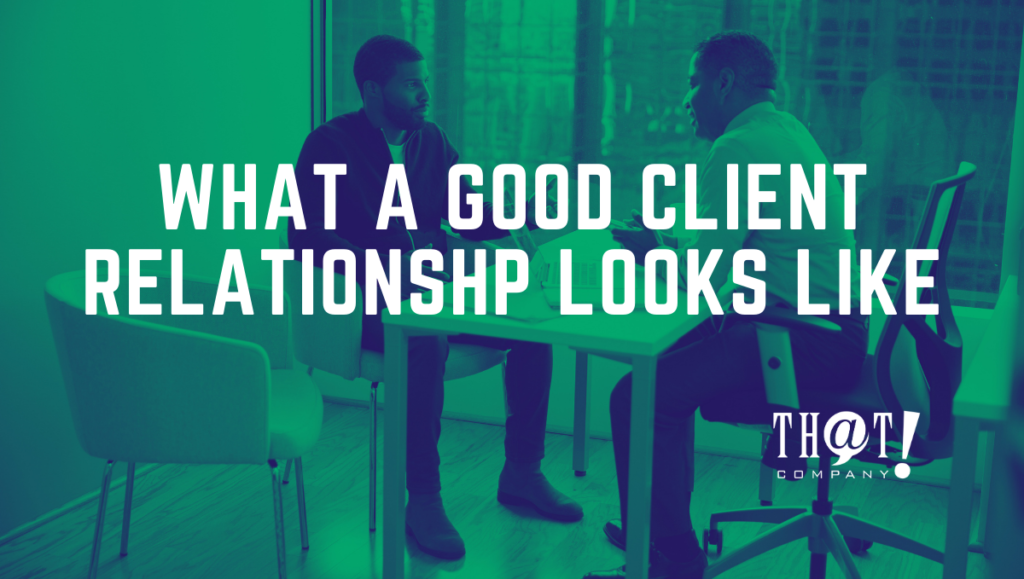
In the marketing industry, client relationships are very important metrics to measure when monitoring the status of an account. The connection between the account manager and client is not only a precursor to success but is usually a requirement. However, not all good client relationships look the same. If you hear your co-worker on the phone with a client and expletives are flying surrounded by loud debating and keyboard smashing, beware. As you may already assume, the client relationship there is sour and bound to fall apart soon. In turn, losing the business a client. Yet, that may not be the case. It could very well be a flourishing relationship where both parties are more comfortable communicating in a way that may seem hostile to those not involved. The characteristics of relationships vary. Yet, there are some telltale signs of a bad client relationship forming that can be noticed and hopefully eliminated before the relationship is doomed forever.
Characteristics of a Good Client Relationship
 While relationships differ in many ways, there are some standard characteristics of a good client relationship that should let you know if you are on the right path. Although many of the traits of a good relationship might seem obvious, they are all important and contribute to greater efficiency between the service and the client. Some of these points may vary in order of importance, yet they are usually present in most good client relationships:
While relationships differ in many ways, there are some standard characteristics of a good client relationship that should let you know if you are on the right path. Although many of the traits of a good relationship might seem obvious, they are all important and contribute to greater efficiency between the service and the client. Some of these points may vary in order of importance, yet they are usually present in most good client relationships:
- Excellent communication
- Knowledge sharing
- Knowledge & exceeding of expectation
- Sharing of opinions
- Positive attitudes
It’s obvious this list can easily grow, depending on the parties involved, however, it should never shrink. All the points listed here are the requirements of a good client relationship. If you find any of these points are missing in your conversations with a client, those are the points to work on.
Characteristics of a Bad Client Relationship
 The traits of a bad relationship are not only more numerous than the good but are also much easier to accomplish. Barely any work has to go into creating a bad client relationship. Yet, the most glaring difference between a good and bad relationship is the fact that a bad one will not last nearly as long. Another huge comparison between the two is that the client will usually notice they are in a bad relationship sooner than the service provider. When this happens, it is usually difficult and often too late to remedy the situation. A good relationship takes plenty of time to build from the bottom up, but it takes considerably more time to convert it to a good one.
The traits of a bad relationship are not only more numerous than the good but are also much easier to accomplish. Barely any work has to go into creating a bad client relationship. Yet, the most glaring difference between a good and bad relationship is the fact that a bad one will not last nearly as long. Another huge comparison between the two is that the client will usually notice they are in a bad relationship sooner than the service provider. When this happens, it is usually difficult and often too late to remedy the situation. A good relationship takes plenty of time to build from the bottom up, but it takes considerably more time to convert it to a good one.
To keep this from occurring, it is best to know the characteristics of a bad relationship ahead of time so you’ll understand and react quickly if you find yourself sinking into one. Here are some of the traits:
- Terrible communication
- Holding back of opinions
- Keeping knowledge of one’s self (no teaching)
- Bad communication etiquette
- Debates that end without solutions
- No strategic planning
- Negative attitudes
- No sharing of data or reporting
- ……And many, many more!
As you can see, there are a lot more traits of bad client relationships than good. This means there are more risks that you can fall out with the client than have them fall in love with you. The list can grow easily depending on who is involved with the party. Maybe your client doesn’t like foul language, so one vulgar phrase in a conversation is a risk. Suppose the client hates to be interrupted while speaking, now knowing when to jump in the conversation is a risk. Keeping a relationship from going bad is hard work, especially initially when you are just getting to know the client. So, knowing some of the general traits of a bad client relationship can help to keep those risks at a minimum.
[bctt tweet=”The traits of a bad relationship are not only more numerous than the good but are also much easier to accomplish.” username=”ThatCompanycom”]Benefits of Converting a Bad Relationship
Turning a bad relationship into a good one is indeed a very difficult task, especially for online marketing companies dealing with remote clients. But it is not impossible and can often be very rewarding. A client relationship that starts off good and stays that way is the most optimal kind of relationship you can have with a client and what we should strive for. When both parties exhibit the traits required of a good relationship it just all falls into place and just feels like “the way it should be”. However, converting a bad relationship into a good one feels like it was “earned”. Any results that come from the converted relationship will feel more like rewards because a lot of work was put in to change the characteristics of the relationship. The client usually gains a sense of loyalty that grows from the amount of work that goes into changing the direction of the association.
As was said before, the client usually feels a bad relationship with the provider of service. They can also tell when that connection is changing, and they are aware that a certain amount of work goes into changing the representation of the relation. Seeing that the liaison is important enough that actual work went into changing the feel of the connection, the client will also feel that dedication towards the work being provided for them.
Good Relationship = Good Business
 Always put relationships first. The work you do and the attitude you do it with is mostly meaningless if the client relationship is sour. Relationships power your business and your business is your dream coalescing into reality. So, you can think of a strong relationship like paying the electricity bill for your dreams. Once you are behind on paying your relationship, you risk being disconnected from your dream. Don’t take this metric lightly. Measure it just as you should measure results for clients. Maybe when you started with the client, they were extremely happy with the expectations promised them. Is that client relationship being tracked? Are they still happy? Is your connection still showing all the characteristics of a good relationship? Don’t ever assume the association is still good just because the client hasn’t mentioned it, check your list. Are you taking risks that could lead to a bad relationship, or can you check off the entire “good relationship traits” list and assure your connection is still strong?
Always put relationships first. The work you do and the attitude you do it with is mostly meaningless if the client relationship is sour. Relationships power your business and your business is your dream coalescing into reality. So, you can think of a strong relationship like paying the electricity bill for your dreams. Once you are behind on paying your relationship, you risk being disconnected from your dream. Don’t take this metric lightly. Measure it just as you should measure results for clients. Maybe when you started with the client, they were extremely happy with the expectations promised them. Is that client relationship being tracked? Are they still happy? Is your connection still showing all the characteristics of a good relationship? Don’t ever assume the association is still good just because the client hasn’t mentioned it, check your list. Are you taking risks that could lead to a bad relationship, or can you check off the entire “good relationship traits” list and assure your connection is still strong?
There’s Never Room to Assume
The main point to take from this reading is to never assume you are part of a good relationship just because you haven’t been told otherwise. There are plenty of indicators to check to see what direction your client connection is headed in. Don’t take risks that can make you acquire bad relationship traits and if you do wind up in a bad client relationship, don’t assume it is the end. Turning that bad connection into a good relationship will reward your business enough to make the work worth it and keep your dream afloat. Also, don’t take the lists here literally. While the points listed are important and the list itself shouldn’t shrink, there are still many traits that can and should be added to it and the importance of each point can differ greatly depending on each client or service provider. The order of the list is not important. The act of understanding it and all traits of good and bad relationships is of utmost importance.





























